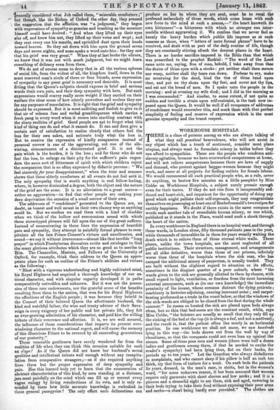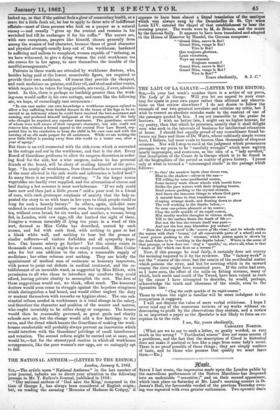WORKHOUSE HOSPIT A LS.
THERE is a class of persons among us who are always talking of what they call practical benevolence, who will not assist in any object which has a touch of sentiment, consider most plans utopian, and always want to formulate misery in tables before they
can afford to sympathize. These are the people who condemn anti- slavery agitation, because we have overworked setnpstresses at home, and will not relieve sempstresses because there are laws of supply and demand, who protest against beggar-women because they might work, and sneer at all projects for finding outlets for female labour. We would recommend all such practical people who, as a rule, never
do anything, to bestow five minutes on a little pamphlet by Miss
Cobbe on Workhouse Hospitals, a subject surely prosaic enough even for their tastes. If they do not rise from it inexpressibly sad- dened and heart-sick, and impatient for the opportunity of doing any good which might palliate their self-reproach, they may congratulate themselves on possessing at least one of Rochefoucauld's two recipes for earthly happiness. We doubt if there exists in the same compass of words such another tale of remediable human misery, or one which, published as it stands in the Times, would send such a shock through the heart of the nation.
In every workhouse in England there is an hospital ward, and through these wards, in London alone, fifty thousand patients pass in the year, while thousands of incurables lie in them for years wearily waiting the death which is to relieve them of those eternal white walls. These places, unlike the town hospitals, are the most neglected of all public institutions. Their structure, management, and arrangements are all alike defective, worse than those of our prisons, infinitely worse than those of the hospitals where the sick man, who has escaped the additional misery of pauperism, is usually tended. They are built without the slightest regard to situation or its effects, sometimes in the dingiest quarter of a poor suburb, where "the wards given to the sick are generally allotted to them by chance, with small regard to light, ventilation, or freedom from the most harassing external annoyances, such as (to our own knowledge) the immediate proximity of the insane, whose screams distract the dying patients; machinery in factories adjoining, causing incessant noise ; and carpet- beating performed as a trade in the court below, so that the windows of the sick-wards are obliged to be closed from the dust during the whole summer." In rooms so located the sick are placed upon beds always clean, but so thin that bed-sores are the constant result, while, says Miss Cobbe, "the bolsters are usually so small that they only fill up the sinking of the bed at the top (it is always a bed, and not a mattress); and the result is, that the patient often lies nearly in an horizontal
position. In one workhouse we shall not name, we saw hundreds lying in this way—the beds drawn out from the wall by way of cleanliness, so that the occupants could not even lean up against the stones. Some of these poor men and women (there were half a dozen ladies and gentlemen among them, if that be needed to excite the reader's sympathy) had been lying thus, flat on their backs, for periods up to ten years." Let the Guardian who always disbelieves in complaints, and who cannot sleep if his pillow is half an inch too thick, try that form of torture for a week. On such beds the patients lie years, dressed, in the men's case, in shirts, but in the women's ward, "for some unknown reason, it has been assumed that women require only garments with short sleeves and low necks ; and it is a piteous and a shameful sight to see them, sick and aged, cowering in their beds trying to take their food without exposing their poor arms and necks—a shawl being hardly ever provided." The clothes are
locked up, so that if the patient feels aglow of momentary health, or a crave for a little fresh air, he has to apply to three sets of indifferent officials—most of them persons who look on a pauper as a natural enemy — and usually "gives up the contest and remains in his wretched bed till he exchanges it for his coffin." The nurses are, with rare exceptions, paupers like himself, chosen generally from among the women of bad character, because those of good character and physical strength usually keep out of the workhouse, hardened to suffering and callous to complaint, women capable of "refusing, as we have witnessed, to give a dying woman the cold workhouse tea she craves for in her agony, to save themselves the trouble of the needful arrangements."
Patients in these wards are attended by workhouse doctors, who, besides being paid at the lowest conceivable figure, are required to provide their own medicines. Of course they provide the cheapest, and such medicines as quinine, cod-liver oil, and steel and other tonics, which require to be taken for long periods, are rarely, if ever, adminis- tered. In this, there is perhaps no hardship greater than the work- ing-man would suffer in his own cottage, and cases like the following are, we hope, of exceedingly rare occurrence :
"In one case under our own knowledge a workhouse surgeon refused to allow a boy suffering from fearful disease in the bones of his legs to be re- moved to an infirmary where he could have received the best assistance and nursing, and professed himself indignant at the presumption of the lady who thought he required any superior treatment. The guardians, several of whom were well aware of their surgeon's character, but who could not remove him without a formal appeal to the central Poor Law Board, sup- ported him in his resolution to keep the child in his own care and with the nursing of an old male pauper for all assistance. While we are writing the poor little fellow is passing away from this world to a better one, after a year of agony."
But there is an evil connected with the sick-room which is corrected in the cottage and not in the workhouse, and that is the diet. Every Board of Guardians professes to allow its surgeon discretion in order- ing food for the sick, but a wise surgeon, unless he has personal friends at the board, will be chary of availing himself of the privi- lege. "In nearly all workhouses, from three-fourths to seven-eighths of the meat allowed in the sick wards and infirmaries is boiled beef." In many there is no possibility of roasting. "In the larger towns vegetables are hardly ever supplied, and the alternation of cheese and beef during a hot summer is most unwholesome. If we only could have now and then just a little greens !' said a poor soul to a friend of ours, with such grotesque emphasis of anxiety that the lady re- peated the story to us with tears in her eyes to think people could so long for such a homely luxury." ln others, again, sick-diet once ordered is continued for months, one man, for example, having beef- tea, without even bread, for six weeks, and another, a woman, being fed, in London, with raw eggs, till she loathed the sight of them. Imagine a woman incurably ill lying ten years in a ward of this sort, dressed as Miss Cobbe has described, nursed by such nurses, and fed with such food, with nothing to gaze at but a blank white wall, and nothing to hear but the groans of similar sufferers—all visitors forbidden and all sympathy hope- less. Can human misery go further ? Yet this misery exists in thousands of eases, and it might be so easily remedied. Miss Cobbe asks for but one addition to the rates, a reasonable supply of medicines; her other reforms cost nothing. They are briefly the appointment of medical men of eminence as honorary inspectors, with power to point out defects in medical treatment, and the es- tablishment of an incurable ward, as suggested by Miss Elliott, with permission to all who chose to introduce any comforts they could afford, leaving private charity to accomplish the rest. The first of these suggestions would not, we think, effect much. The honorary doctors would soon cease to struggle against the hopeless stinginess which distinguishes a bad board, and would either neglect the duty or content themselves with remarks on hygiene alone. The one sub- stantial reform needed in workhouses is a total change in the salary, and therefore the character and position of the master and matron, who ought invariably to be either clergy or surgeons. The houses would then be reasonably governed, as great gaols and charity schools now are, but the change would add a few farthings to the rates, and the dread which haunts the Guardians of making the work- houses comfortable will probably always prevent an innovation which would interfere with the Guardians' privilege of small interference and vexation. The second reform might be carried out at once, and would be,—but for the stereotyped routine in which all workhouse arrangements, like the poor woman's raw eggs, are so unhappily apt to fall.































 Previous page
Previous page